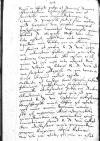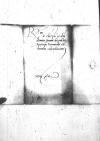 AAWO, AB, D. 19, No. 14_1
AAWO, AB, D. 19, No. 14_1
Reverendissime in Christo Pater et Domine, domine observatissime.
Officiosissimam mei et servitutis meae commendationem.
Ex litteris domini Paweł Płotowski (*ca. 1485 – †1547), in 1523, after the death of Fabian von Lusian (Luzjański), Płotowski was one of the King's four candidates for the post of the bishop of Ermland; in 1530 and 1537, after the death of Jan Konopacki (Johann von Konopat) Sr and Dantiscus' transfer to the bishopric of Ermland, he made an effort to obtain the dignity of bishop of Kulm; from 1522 Provost of the Ermland (Warmia) Chapter, and from 1523 Canon of Ermland; secretary to Crown Grand Chancellor Krzysztof Szydłowiecki, and from 1533 royal secretary and courtier; in the thirties and forties several times royal envoy to the Royal Prussian Estates (SBKW, p. 191; KOPICZKO 2, p. 249-250)⌊praepositiPaweł Płotowski (*ca. 1485 – †1547), in 1523, after the death of Fabian von Lusian (Luzjański), Płotowski was one of the King's four candidates for the post of the bishop of Ermland; in 1530 and 1537, after the death of Jan Konopacki (Johann von Konopat) Sr and Dantiscus' transfer to the bishopric of Ermland, he made an effort to obtain the dignity of bishop of Kulm; from 1522 Provost of the Ermland (Warmia) Chapter, and from 1523 Canon of Ermland; secretary to Crown Grand Chancellor Krzysztof Szydłowiecki, and from 1533 royal secretary and courtier; in the thirties and forties several times royal envoy to the Royal Prussian Estates (SBKW, p. 191; KOPICZKO 2, p. 249-250)⌋ factus sum certior, quod Alexander von Suchten (*ca. 1520 – †1576-1590), doctor of medicine, alchemist, poet; studied in Leuven, Ferrara, Rome, Bologna and Padua; as a nephew of Alexander Sculteti, accused of heresy and sentenced in 1545 to lose a canonry and hereditary property; 1538-1545 Canon of Ermland (Warmia); 1549 court physician and librarian of Ottheinrich of Palatinate-Neuburg; 1557 court physician of Sigismund Augustus in Vilnius (PSB 45/3, p. 337-338)⌊Georgius(!) von SuchtenAlexander von Suchten (*ca. 1520 – †1576-1590), doctor of medicine, alchemist, poet; studied in Leuven, Ferrara, Rome, Bologna and Padua; as a nephew of Alexander Sculteti, accused of heresy and sentenced in 1545 to lose a canonry and hereditary property; 1538-1545 Canon of Ermland (Warmia); 1549 court physician and librarian of Ottheinrich of Palatinate-Neuburg; 1557 court physician of Sigismund Augustus in Vilnius (PSB 45/3, p. 337-338)⌋ acceperit possessionem ca<no>nicatus Varmiensis, quem habuit dominus Paweł Snopek (*after 1480 – †1554), close collaborator of Ioannes Dantiscus; Econom of the Dominium Ermland (Warmia); in 1524 mentioned as Canon of Guttstadt (Dobre Miasto) for the first time; 1528-1554 Provost of Guttstadt; 1536-1538 Canon of Ermland (in December 1538 he was forced to resign in favour of Alexander von Suchten; in 1543 he regained this prebend but two years later had to step aside for Kaspar Hannau) (KOPICZKO 2, p. 308; SBKKDM, p. 103; SBKW, p. 227; PSB 39/3, p. 405-406)⌊SnopeckPaweł Snopek (*after 1480 – †1554), close collaborator of Ioannes Dantiscus; Econom of the Dominium Ermland (Warmia); in 1524 mentioned as Canon of Guttstadt (Dobre Miasto) for the first time; 1528-1554 Provost of Guttstadt; 1536-1538 Canon of Ermland (in December 1538 he was forced to resign in favour of Alexander von Suchten; in 1543 he regained this prebend but two years later had to step aside for Kaspar Hannau) (KOPICZKO 2, p. 308; SBKKDM, p. 103; SBKW, p. 227; PSB 39/3, p. 405-406)⌋. Mihi vero num lite cesserit, nihildum certi cognovi. Equidem non dubito pro ea fiducia, quam in favore et gratia Reverendissimae Dominationis Vestrae erga me collocatam habeo, quin non alia ratione canonicatu illo cessum Alexander von Suchten (*ca. 1520 – †1576-1590), doctor of medicine, alchemist, poet; studied in Leuven, Ferrara, Rome, Bologna and Padua; as a nephew of Alexander Sculteti, accused of heresy and sentenced in 1545 to lose a canonry and hereditary property; 1538-1545 Canon of Ermland (Warmia); 1549 court physician and librarian of Ottheinrich of Palatinate-Neuburg; 1557 court physician of Sigismund Augustus in Vilnius (PSB 45/3, p. 337-338)⌊eiAlexander von Suchten (*ca. 1520 – †1576-1590), doctor of medicine, alchemist, poet; studied in Leuven, Ferrara, Rome, Bologna and Padua; as a nephew of Alexander Sculteti, accused of heresy and sentenced in 1545 to lose a canonry and hereditary property; 1538-1545 Canon of Ermland (Warmia); 1549 court physician and librarian of Ottheinrich of Palatinate-Neuburg; 1557 court physician of Sigismund Augustus in Vilnius (PSB 45/3, p. 337-338)⌋ sit, quam ut ipse mihi lite cederet. Hoc enim videor ex litteris Reverendissimae Dominationis Vestrae ad me scriptis collegisse. A qua tamen in horas aliquid certius exspecto.
Abducta est tandem serenissima Isabella Jagiellon (*1519 – †1559), 1539-1559 Queen of Hungary; from 1539 wife of John Zápolya, King of Hungary, mother of John II Sigismund Zápolya; daughter of Sigismund Jagiellon, King of Poland, and Bona Sforza⌊sponsaIsabella Jagiellon (*1519 – †1559), 1539-1559 Queen of Hungary; from 1539 wife of John Zápolya, King of Hungary, mother of John II Sigismund Zápolya; daughter of Sigismund Jagiellon, King of Poland, and Bona Sforza⌋ Calendis Februariis. Epithalamia scripserunt nonnulli adolescentes. Inter eos doctor Stanisław Aichler (Stanislaus Glandinus) (*1520 – †1585), doctor of canon and civil law in Bologna (1537), humanist, lawyer, poet, son-in-law of Jost Ludwig Dietz (Decius); 1538 Cracow town clerk; alderman of Magdeburg law at the Cracow castle (PSB 1, s. 33)⌊GlandinusStanisław Aichler (Stanislaus Glandinus) (*1520 – †1585), doctor of canon and civil law in Bologna (1537), humanist, lawyer, poet, son-in-law of Jost Ludwig Dietz (Decius); 1538 Cracow town clerk; alderman of Magdeburg law at the Cracow castle (PSB 1, s. 33)⌋, cuius aetas quae sit, non ignorat Reverendissima Dominatio Vestra. Ceterum Sebastianus Marschewscki minor adhuc est aetate, agit nunc annum decimum nonum, sed est ingenium illius admirabile, quemadmodum ex carminibus eius coniecturam faciet Reverendissima Dominatio Vestra. Callet idem adulescens aeque propemodum Graecam linguam atque Latinam. Non vidi pari aetate, qui cum eo esset  AAWO, AB, D. 19, No. 14_2 conferendus.
AAWO, AB, D. 19, No. 14_2 conferendus.
Supervacaneum esset me describere Reverendissimae Dominationi Vestrae nuptias istas, cum ex iis, quae mitto, possit omnia cognoscere. Praeterea nihil huc allatum est novi, nisi quod qui missi erant speculatores a John Zápolya (János Szapolyai) (*1487 – †1540), 1526-1540 King of Hungary; son of István Szapolyai and Jadwiga of Cieszyn in 1540 married Isabella, dauther of of King Sigismund Jagiellon of Poland. He fought against Ferdinand of Habsburg for the right to the title of King of Hungary⌊rege IoanneJohn Zápolya (János Szapolyai) (*1487 – †1540), 1526-1540 King of Hungary; son of István Szapolyai and Jadwiga of Cieszyn in 1540 married Isabella, dauther of of King Sigismund Jagiellon of Poland. He fought against Ferdinand of Habsburg for the right to the title of King of Hungary⌋, ii redierunt hidden by binding⌈[t]t hidden by binding⌉, atque cum in diversis fuissent locis, ita ut unus de alio nihil scire potuerit hidden by binding⌈[it]it hidden by binding⌉, idem tamen omnes retulerunt, decretum hidden by binding⌈[tum]tum hidden by binding⌉ esse omnino Suleiman the Magnificent (*1494 – †1566), 1520-1566 Sultan of the Ottoman Empire⌊Turcarum tyrannoSuleiman the Magnificent (*1494 – †1566), 1520-1566 Sultan of the Ottoman Empire⌋ aut potiri hoc anno Hungary (Kingdom of Hungary)⌊HungariaHungary (Kingdom of Hungary)⌋, aut in ea hidden by binding⌈[a]a hidden by binding⌉ perire. Quod posterius faxit Deus, ut eveniat. Confirmatur etiam rumor de classe Suleiman the Magnificent (*1494 – †1566), 1520-1566 Sultan of the Ottoman Empire⌊illiusSuleiman the Magnificent (*1494 – †1566), 1520-1566 Sultan of the Ottoman Empire⌋ maiori ex parte tempestatibus submersa statutumque illi esse aiunt, nunquam amplius classe decertare aut eam conficere, etiamsi de omnibus locis maritimis hidden by binding⌈[s]s hidden by binding⌉ in dubium ei esset veniendum.
Paul III (Alessandro Farnese) (*1468 – †1549), 1493 elevated to cardinal; 1524 Cardinal-Bishop of Ostia; 1534-1549 Pope⌊PontifexPaul III (Alessandro Farnese) (*1468 – †1549), 1493 elevated to cardinal; 1524 Cardinal-Bishop of Ostia; 1534-1549 Pope⌋ interea de sancti Petri patrimonio hidden by binding⌈[o]o hidden by binding⌉ augendo deque Urbino⌊UrbinoUrbino⌋ sub imperium ecclesiae subiungendo sollicitus est. Nihil aliud occurrit scriptu dignum. Commendo me gratiae Reverendissimae Dominationis Vestrae. Deum precor, ut eam in multos annos incolumem servet.
 AAWO, AB, D. 19, No. 14_2 conferendus.
AAWO, AB, D. 19, No. 14_2 conferendus.


